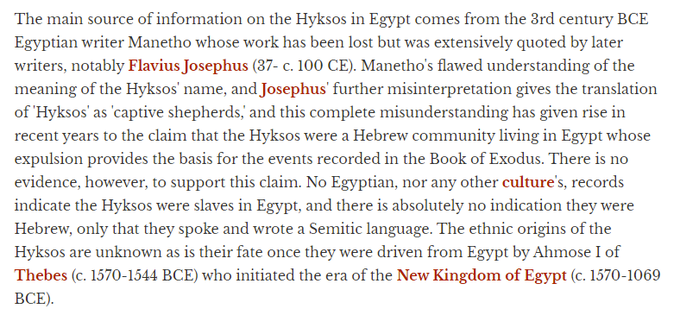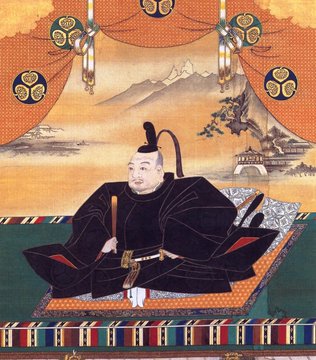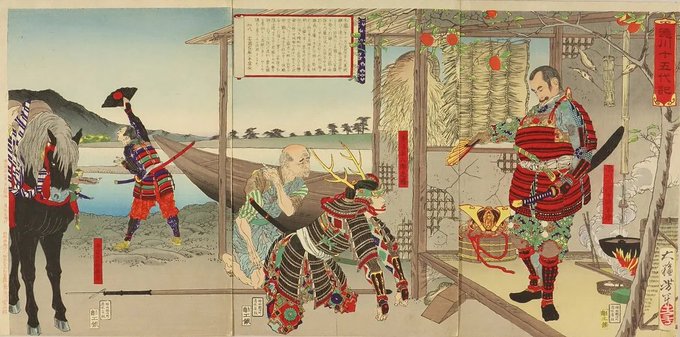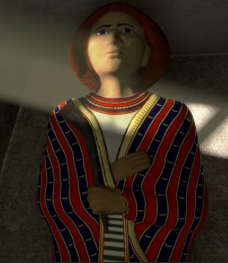Akhenaten was a pharaoh of the 18th Dynasty, one of the last such pharaohs. His reign saw the instatement of one of the world’s first monotheistic religions, Atenism. This was a period of social upheaval and political instability that saw the collapse of the 18th Dynasty. Aten was analogized to the Sun God, but was not entirely the same as previous understandings of Egyptian deity. Instead, he was a sole and supreme creator god. Unlike Egyptian polytheistic gods, he was not to be depicted with graven idols, so he was symbolized by the sun. Interestingly, Akhenaten was not the eldest son of his father. He had an older brother, Thutmose, but for some reason, Thutmose did not inherit, despite not dying in infancy, and living to adulthood. But some time in his adulthood, the crown prince, Thutmose, disappears Akhenaten’s reign is troubled and he is succeeded by a chaotic succession of pharaohs, including women and his child son, “King Tut”. Eventually the chronology dissolves into a muddle entirely, with all manner of alleged (rival warlord claimant?) pharaohs, before the 19th.
There is a myth, the Osarseph myth, which is said to describe this time of instability and the end of the 18th Dynasty. The rightful pharaoh, Amunhotep, the name of several pharaohs of the 18th Dynasty, including Akhenaten, desires to see the true God. He is given a prophecy in which Egypt will suffer ruin unless he drives out the unclean people. For some reason, he does not drive out the unclean people, but instead enslaves them and sends them to quarry for no reason. Then, also for no reason, he gives them a city, Avaris. Because he is schizophrenic, he decides to besiege Avaris, but his army turns against him and he cannot press the attack, and instead, fearful of the gods, he flees into exile for twelve years. At this point, his child son grows up into adulthood and restores the throne. The leader of the rebels, Osarseph, is driven out. Ramesses, the child pharaoh, restores the worship of the Egyptian pantheon and brings peace to Egypt.
This is said to be a mythologized history of the Amarna period and Akhenaten. Ramesses is a new founder, so he needs a myth. Instead of being Ramesses I, random warlord done well, he is Ramesses I, son of Amunhotep, rightful pharaoh, restorer of Egypt. Osarseph is said to represent Akhenaten, because he destroys true religion. But Amunhotep also desires to see the Gods. Well, whatever. There is a duality of Osarseph and Amunhotep both being the pharaoh and possibly Akhenaten and this being some sort of complicated mythmaking around Osiris and Horus, ending in reconciliation. Great. Except why make one figure into two?
And there’s one more thing.
Although the Egyptians called him Osarseph, Manetho says that he called himself… Moses.
Gentleman, we have a mystery on our hands. Why would Judaism and Atenism both come about, independently, at about the same time? Two cultures inventing monotheism simultaneously? Perhaps the two are related. Perhaps this myth deserves more attention. Josephus identifies the Jews with the Hyksos, a Semitic Sea People that invaded Egypt, establishing the 15th Dynasty. Confusingly, the 15th Dynasty coexisted with the 16th Dynasty and 17th Dynasty, only ending with the founding of the 18th Dynasty and their subjugation. So now we have a name for our mysterious enslaved people and a motivation to keep them down. After all, these are foreign raiders who conquered Egypt, and your dynasty restored legitimate native rule. And if the Hyksos are the Jews, then of course they set up in Avaris. Avaris was, after all, the capital of the 15th Dynasty.
But why would Pharaoh be unable to overcome them? Why would he struggle to siege the fortress and have a weakened reign? Perhaps his soldiers saw the strange leader of the unclean people as more legitimate. Where does the name Moses come from? It is not Hebrew in origin. It’s Egyptian. It derives from the Egyptian Mose or son. And it was said that Moses was an (adoptive) Egyptian prince. Perhaps the Pharaoh could not overcome the great host at Avaris because it was Hyksos warriors. And perhaps Pharaoh could not prevail over Osarseph, or Moses, because his soldiers did not trust him. Perhaps Osarseph is not a strutting Priest of Osiris gone bad leading a band of lepers that can somehow overpower Pharaoh himself, but a Prince of Egypt. Prince Thutmose. What then? The story of Exodus, as narrated by both Egyptian and Jewish sources, becomes the retelling of a story of dueling legitimacies between Princes at the dawn of monotheism, a belief so explosive it ends Egypt with all manner of (possibly divine) calamities. Why do the Jewish slaves long to worship the pagan gods again and wax nostalgic about Egypt? Would a crushed slave people do such a thing? Probably not. But a people that remembered *ruling* Egypt would. Especially if many of the living were not slaves, but of a prince’s retinue. And Moses’s tablets. Are they just fictional? Or are they evidence of an already present writing system? One that is said to be derived from the cultural meeting of a Semitic people with Egyptian culture and its hieroglyphics? Maybe this happens by trade. But maybe not.
But we are modern people who believe in modern histories, and not silly stories like Exodus. Exodus has been deboonked. There is no evidence tying the Hyksos to the Jews. It says so right there. Josephus and Manetho, despite being ancient scholars, are far less informed than us.

What is the true origin of the Hebrews? Well, obviously, the Habiru. Who were the Habiru? Well, they were a social caste of outlaws, mercenaries, thieves, and laborers, and their name meant unclean, and they lived like Roma. Modern scholars sound awfully anti-semitic.
One problem with the Habiru theory is that the Habiru were explicitly not a people, but a social class and a descriptor of a group outcast from society. But they do have some evidence that, at some point, there is an ethnogenesis moment where the Habiru organize into a people. At this point, this band of thieves and nomads spontaneously transforms into an organized people which run an complex agricultural society and kingdom. I am sure that if we observe the Roma long enough, this will also spontaneously happen, one day. Okay. So how do we know this and when does this happen? It’s simple. The Amarna letters. Amarna? Why are they called the Amarna letters? Well, because they date to the Amarna period. The late 18th Dynasty. The period of Akhenaten. What a strange coincidence. So right at the time that the mythical Moses is said to be leading his people out of Egypt, first to Avaris then to exile in the Syrian Levant, the Habiru, heretofore nomads, spontaneously organize into an settled agricultural people. But wait, there’s more. What did Manetho call these followers of Moses? Lepers? Outlaws? Unclean people? … Habiru?
The Great Retreat in the 14th Century BC. Behind you is a palace, a kingdom, a people, and your own family. Ahead of you is an unknown future full of struggles, pain, and long wandering. All you have to guide you is faith in God. But your reward? Immortality. No looking back.


Now, is this true? I wouldn’t be able to tell you definitively. Do I think it is plausible? Yes, absolutely, and this was a scholarly hypothesis people generally held only fifty years ago. It was debunked alongside Carthaginian child sacrifice and Aztec human sacrifice rites.
The modern hypothesis is that humans come up with these highly complex myths with no basis in reality for no reason other than self-legitimation or to slander or praise other ancient peoples. But maybe they don’t. Maybe all the myths are in some way essentially true. And that’s a greater point I want you to think on. How winners and losers write history. How we frame the past. What myths mean. And fundamentally, how do we, as peoples, remember.
There can be miracles when you believe.
PS Exodus says the Jews dwelled in Egypt 430 years. Stratographic layer G, where the temple to Set/Hadad was erected by Canaanite settlers in Avaris, dates to 1780BC. 430 years from that is the reign of Akhenaten. So I was talking about this with a friend, and he pointed out that the garbling (and there must necessarily be some garbling) could easily be a garbling of Amunhotep/Akhenaten and Horemheb, the last pharaoh of the 18th – in a sense. He was not related to the dynasty.
Horemheb, like Manetho’s Amunhotep, is exiled, and eventually names his “son”, Rameses I as the next pharaoh, even though he is not the same as Amunhotep/Akhenaten. If this is the correct interpretation, then some more things come into focus. While I am more romantically attracted to the idea of Moses returning and dramatically confronting his brother, ala Prince of Egypt, the Horemheb/Ay theory clarifies the verse where God tells Moses that all those who sought him are dead. The death of Ay in 1320BC is the death of the last of the Thutmosids and related pharaohs. The dynasty is now thoroughly extinct. Nobody who would remember Moses is left. This would be a mercy from God. When he returns to Egypt, 40 years after 1360BC, he is confronting a stranger.
It is also a time of persecution. Egypt is destroying Atenism and its temples to return to the old ways. If Atenism is related to proto-Judaism, then certainly, these are now an oppressed people. Why does Horemheb pass his throne to Rameses I? Because he has no surviving sons. Now, like the previous interpretation, this takes some garbling – this time to mash Akhenaten and Horemheb into the Amunhotep figure. But I think, regardless, this era is the right era, and the figures are broadly correct. More corroboration? The wife of Amunhotep III. Tiye was non-Egyptian and had unusual religious views. Jewish? Or rather, Hyksos? If so, then perhaps the mother of Akhenaten and Thutmose was Jewish.
The Aten moment would have been the big eruption of a cultural syncretism reaching back centuries.
Yes, centuries. After all, the Hyksos flight is downstream of another interesting event – a shogunate in the land of pyramids and sand. But that’s a thread for another day.


Editor’s Note: At the time of compilation, I have completely accepted the Horemheb hypothesis and accordingly praise the great mercy of God, who spared his beloved Moses from confronting his actual brother. One of the proto-Semitic stele is also a praise of God (as Ptah-Osiris) and Amunhotep, Moses’s father. This is very sweet.
The 13th Dynasty, which began in 1803BC, was a time of great unrest. It was contemporary with the 14th Dynasty, and was characterized by great decline, plague, and famine. It would eventually retreat south, leaving the north to the 14th Dynasty.
The 14th Dynasty was a dynasty of Egyptian origin which ruled over the West Delta from Xois, and lasted 184 years. Little is known about it, and it was ultimately subsumed by the… the 14th Dynasty? Wait, let me check my notes. The 14th Dynasty, which began some time between 1800BC and 1725BC, was a dynasty of Hyksos origin which ruled over Northern Egypt. Its rise to power is obscure and so is its collapse. Like its contemporary, the 13th Dynasty, it presided over a period of famine. Though while the 13th Dynasty was declining, this 14th Dynasty was rising. It came to rule over all of Northern Egypt from its capital, Avaris, and eventually pushed the 13th Dynasty out of even historic Memphis, looting and pillaging the city to decorate Avaris. This is why the 13th Dynasty moved its capital south to Thebes, since it had lost Memphis, and why it proudly proclaimed its rule over Memphis in its twilight hours. Wait… what? The 13th Dynasty was in decline almost as soon as it was founded, as the 14th Dynasty emerged early. The 13th Dynasty was tremendously short lived by its monuments. The 13th Dynasty was tremendously long lived per Manetho, with a staggering 76 pharaohs. Hrm. Eventually both the 13th and 14th Dynasties are swept away by the rising of the 15th Dynasty, which, per Manetho, comes to power without conflict. Huh? How can the 15th Dynasty displace the powerful 14th Dynasty without issue? The 15th Dynasty is founded by a “Salitis”.
Some have attempted to connect this name to “shallit”, one of those titles Joseph had during Genesis. Obviously, we don’t believe such silly myths – the Bible is a work of fiction. We are hard-nosed realists who only believe in power politics. But for curiosity’s sake, what does “shallit” mean? It’s simple. It’s the Hebrew word for shogun. What were the problems plaguing the 13th Dynasty? Famine. The loss of crops. Why is Avaris a power center? Because Avaris was built with massive granaries, making it a focal point of Egyptian power in a time of mass starvation. It was a natural spot for a capital. Manetho doesn’t recognize our archaeological 14th as a dynasty – because it wasn’t one.
Avaris was not the seat of a dynasty, but the site of a shogun using control of grain to rule over northern Egypt. Why did the 13th Dynasty claim rule over Memphis until the end? Because, from their point of view, they had never lost Memphis. It was administered by the shogun. Until, of course, it wasn’t. How can the 15th Dynasty overthrow the 13th Dynasty and 14th Dynasty without a violent struggle? Because it *was* the “14th” Dynasty, the shoguns making de jure what was previously de facto. Who was going to stop them? Look at me. I am Pharaoh now. Of course, no action comes without a reaction. Why are the Hyksos enslaved? Perhaps, as Manetho describes, the population experiences them as cruel foreign tyrants who “got the granaries of Egypt into their possession, and perpetrated many of the most horrid actions there.” Nativist dynasties arise to oppose the Hyksos 15th Dynasty, the 16th, 17th, and eventually, the 18th Dynasty. The Hyksos were destroying the temples of the native gods and blaspheming the Egyptian pantheon. The people were appalled and begged to be saved.

Except Rameses isn’t the capital of the Hyksos. Or is it? Avaris was renamed and rebuilt in the 19th Dynasty. Its new name? Pi-Rameses.
In Manetho’s Aegyptica, Osarseph/Moses, rebel priest of Osiris, leads the Habiru army to Avaris, city of the Hyksos. In Exodus, Moses leads the Jews through Rameses, aka Avaris, on their road to freedom. And do you recall Prince Thutmose? He was a priest of Ptah. Ptah-Osiris.
With this in hand, we can construct a Biblical chronology.
1780 BC: First Canaanite settlers in Egypt in Avaris
~1800-1700BC: The Hyksos Shogunate begins with Joseph
1750BC(?): Joseph invites his brothers to dwell in Egypt, settling in Avaris
~1650BC: The Hyksos Shoguns overthrow the 13th Dynasty and proclaim themselves Pharaoh
Middle 1500s: Ahmose I subjugates the Hyksos.
The Egyptian captivity begins. This is in the 18th year of Ahmose I. If Ahmose begins his reign in 1539BC, this is 1520BC.
~1390s BC: Crown Prince Thutmose is born. He is made Priest of Ptah-Osiris.
1360 BC: Thutmose disappears from the record, possibly “killed” by Annan, Priest of Amun(?) in a power struggle
1320 BC: Thutmose returns as Moses. He delivers the Israelites from slavery.
Sanity check. “Now the length of time the Israelite people lived in Egypt was 430 years.” 1320 BC is 430 years after a possible date of Joseph settling his brothers during the Hyksos Shogunate. Seder Olam says the time the Jews were in slavery was 200 years. 1520-1320BC. The chronology of Exodus is internally consistent so far. What about the arrival in Canaan? 40 years from 1320BC is 1280BC, and the Conquest of Canaan takes 7 years, so that the people of Israel are settled in the Promised Land in 1273BC.
Except there is an alternative explanation. Early Exodus holds that the Jews depart in 1447BC, wander for 40 years, make war on Canaan, and Jericho falls sometime shortly after 1400BC.
Why 1447BC? Because that is 851 years from the ruin of the Temple, and the LORD says that Israel will be exiled one year before it grows old (852 years). The first exile begins in 597BC, so the exile happens 850 years and change beforehand, in 1447BC. And this too is consistent.
And for this chronology, they have the ruins of Jericho. The 1550BC dating of the sack is rejected because within Jericho exist scarabs of Amenhotep III, which means logically Jericho did not fall until his reign. And it did not fall after, otherwise there would be more scarabs.
Except… 597BC is a secular date. If we are counting with Rabbinical years, why not start counting backwards from the Rabbinical year of exile? By the Rabbinical tradition, the sack happened in 423BC. And what is 851 (850 inclusive) years before that? 1273BC. Our settling date.
47 years before that? 1320BC, when we have Moses returning to Egypt. Game. Set. Match. As a bonus, Pharaoh’s daughter. It’s two different people. One is the mother of Moses, the other simply is another Pharaoh’s daughter. Not all of Akhenaten’s daughters have tombs.
Neferneferuaten Tasherit is unaccounted for and she would have been 25 when Moses returned to Egypt, with no other living relatives. A perfect candidate to marry one of the Jews and get pregnant, rather than a 100 year old woman being seduced and impregnated. One last loose end. How can Jericho can be sacked by Joshua when it was sacked in 1400BC, before Moses? The dating of Jericho depends on the scarabs. So it must be at least the reign of Amenhotep III. Except there’s one thing. Amenhotep III was the last Pharaoh to issue scarabs.
The sack of Jericho can not occur before Amenhotep III, but certainly it can occur after. And carbon dating has a margin of error of 150 years.
PS:
When I wrote this thread, I never expected to find a smoking gun. There’s a smoking gun! There’s been a smoking gun for SIXTY YEARS. Gerster I is an inscription of Sekhemrekhutawi in PROTO-SINAITIC in 1760BC asking El to give rest to his companion Heber.
THE JEWISH PHAROAH ASKS EL TO BLESS HIS COMPANION, HEBER, ONE OF THE DESCENDANTS OF JACOB WHY IS THERE A JEWISH PHAROAH And I found this being used as evidence AGAINST THE BIBLE

From Avaris, the capital of the Hyksos, surrounded by 12 tombs
https://madainproject.com/avaris_statue
The Jewish Pharoah with a coat of many colors, blesses Heber. I thought his coat of many colors would be more stylish. Kinda dorky.
But it would change people’s characters. Why are there distinctions in character? Because all those traits have purpose. That which is purposeless is slowly selected out. What we call evil is often us failing to understand how things, by nature, can have bad consequences.
Those bad consequences do not come because that thing must always be bad, but because the badness is from a disordering from the circumstance. The evil is because the thing is out of its place. If only everything could be in its proper place, then there would be no evil. Why is aligning your will with God’s the highest good? Because God is love and his order *is* good. If we were all in place, the unfolding of reality would be like a beautiful dance, with intricacy beyond knowing, fractal complexity which, nevertheless, is sweetness and light. Yes, you were not born a sexual sadist. But is it not right that some are? Because sexual sadism is only the disordered expression of an urge that can be channeled in a positive way. Every day, I have the choice to either smite evil or indulge sexual sadism. What tells my brain that sexual sadism is pleasurable is also why I take great pleasure to exert my power against evil. This is also what witch hunters on Twitter and elsewhere are doing, but they have misidentified evil. But if they were hunting real witches…? These women aren’t the descendants of witches. They’re often the descendants of Puritan white women who burned witches.
Tell me the witches shouldn’t be burnt.
Go on. The monsoon brings fertility to the land. Isn’t it the fault of our stupidity and reckless desires to put ourselves in the way? The wolf regulates the deer. “Natural evil” is merely the consequences of natural laws playing out in a way *we* find undesirable. How prideful we are.
Where were you when I laid the foundations of the earth?
Tell Me, if you have understanding.
Who determined its measurements?
Surely you know!
Or who stretched the line upon it?
To what were its foundations fastened?
Or who laid its cornerstone
But why have that dynamic at all? Precisely because it is a dynamic, a negative feedback loop, a cycle. When you have a cycle, it can adjust – the high part of the cycle or the low part can become the new baseline in response to shifts in environment. The homeostasis can change. Humans don’t design in dynamics, they design in statics. We like to pin things down and make a machine. Machines break. Machines are fragile. When a machine finds an unsuitable environment, it cannot adjust to the new parameters. A dynamic can, because its high can become low. A disordering is never as disordered as it *must be*, because the brilliance of God’s design allows to reclaim goods from evils, even when we choose the evils. Our children and their children can find goodness after adapting to a new, imperfect order. But we deprived ourselves of what could have been without the Fall. What else is dynamic? Music. God is using the laws of reality to play a great symphony, but he depends on us to play the instruments. Yet so great is His majesty, he can turn sour notes into a stunning movement.
Let’s have an example. The founder of the Plantaganets, Geoffrey Plantaganet, Count of Anjou. We’ll call him Jeff. Jeff, like many nobles, was autism golem. Like many autism gremlins today, he wanted succubus gf. You should not want this. But he did. This was an evil desire, and because of this, the House of Plantaganet was cursed with the madness of their demon blood. But yet, good came of it too, because when their nobler members submitted to the will of God, England was brought to greatness. Their qualities were leveraged. Richard the Lionheart was a great man *because* of that which also made him terrible, but it was his Nephilim character that was harnessed to do great and just things in the Crusades, so long as he submitted to God, who takes our clay and makes it into a pot.
Another analogy. Our houses are like structurally unsound houses that have not yet fallen in. God is trying as hard as He can to save our all houses, but we insist on dwelling in them, and we also love the way the roof sag complements the drapes. We adore the dismalness. My soul is like a house in ruins! God is the Contractor of my soul. If I let Him in to do His work, I can yet be saved from the consequences of my own actions, like my sinful desire to masturbate to /gif/. But the house may yet fall in, and thus, I am damned, because of *myself*. I chose to OWN that guy or tell myself I’m not so bad or so many other things which are like a man running the sink to overflowing in a home, causing flooding and water damage, and yet I blame God for the consequences of my own actions? Absurd. We all see the NPCification of people who get addicted to weed or video games or gambling or any other pleasure. We see the NPCification of those who indulge in pride (virtue signaling) or greed (get rich quick schemes and shitcoins).
Only by abandoning our pride (our virtue signaling and conviction in our own virtue) can we achieve real virtue. Only by abandoning get rich quick schemes do people actually start getting rich. Our disordered desires keep us away from the actual goods they pretend to point to. There’s a unifying theme there that I can’t put my finger on, but I’m not just rambling, I swear. It’s all one thing. Or another thing. Why do famines and plagues come with the falls of empires when they are natural phenomena? Isn’t that weird? Well, they hasten the collapse of that regime. But why would that be good? Can you name a single bad regime that lasted more than a century? Yes, famine is very bad. But the disasters that strike down failing governments are like amputating an arm.
Imagine how bad the Thousand Year Lib Reich would be if the trends we see now continued for another thousand years.
Who will starve? 1. People who have no friends and family that love them AND 2. Who refused to see warning signs and prepare for themselves In some sense, it is a *targeted* attack that nevertheless obeys natural laws.
January 1st, yet again.
“And now, lest he put out his hand and take also of the tree of life, and eat, and live forever”-
Eternity is a terrible thing indeed. Eternity is a wondrous thing indeed. People often ask why a loving God might condemn mankind to Hell. This is a misunderstanding, I think. Hell and Heaven are both choices, and Hell is a separation from God. Absent this connection, the love of God is like an unending burning agony. This life is the time for toil and the time for choices, while we still have a body and flesh. Continuously, we face choices, where we must choose between good and evil. These choices are, in many ways, the choice between The Good and The Evil. Though men act as if the choice is hard, the choice is often easier than we think. The wages of sin are death. We find often that sin is self-defeating. The greatness of the great comes not from their sins, but their virtues, which are often twisted. To paraphrase CS Lewis, what is Attila without his courage? It is the only things present in great but wicked men that allow them to do their deeds. And given these gifts, it is all the more tragic when they freely choose evil. So what is eternity? Eternity is a time when choices end, and our existence stretches on forever. When we are wrathful and seethe, it feels like our soul is burning up, but it does not harm our enemy. When we are greedy, we obsess over wealth to no avail. So on, and so forth. What if we were perpetually locked in a state of cope and seethe? And moreover, we no longer have the fleeting distractions and pleasures of the flesh to assuage our pain, but exist in an unmediated spiritual state of cope and seethe. When we die, therefore, unless we have achieved a state of total depravity or Sainthood in our lifetimes, we exist in an impure state, but one which is either inclined to choose either The Good, which is God, or The Evil. Given this, what is our conclusion?
Everything not fit for eternity must perish. What then is Hell? It is not the arbitrary cruelty of an evil God. Rather, God is full of love. When Adam and Eve ate from the Tree of Knowledge, they became like God, able to discern Good and Evil – and thus sin.
Nevertheless, God will save us. What are our souls? Our souls are like rotting mansions, deep in disrepair. The roof is caving in, bed bugs and spiders roam the roams, every hall is covered in mold and grime, and it is terribly drafty. We do not notice.
We are always out in the world. But one day, that long night will descend upon us, and we must go home to sleep, and sleep for the long sleep. What we will return to? Dwelling in our sin, we will tormented by the bugs and winds and rains forever, and the burnings shall never cease. But it need not be that way. God wants to repair our houses, however shabby they may be. He has sent His Son to us.
After all, Jesus was a carpenter. Every time we repent of one of our sins, we are fixing one of the broken parts of our houses, making it fit for eternity. We are trading the temporary joys of sin – or oftentimes, the temporary excitement, less than even joy – for something permanent. Every time I discard a sin, I feel a new calmness descend into my soul. With truly holy people, one finds them almost totally at peace, unbothered by the swayings of the world.
Such is fitness for eternity. So why must Job suffer? For Job was a righteous man. And it was true that Job was blameless in his ways. But Job was not the Lord. His own right arm could not save him. His talents, in the end, do not come from within himself. Some lessons can only be taught by affliction. To continue, what is path dependence? Path dependence is a sequencing of events such that each step depends on the previous step. Certain things only unfold as they do because of the sequencing. What does this mean? On Thursday, you go grocery shopping but forget the milk. After a workout on Saturday, you suddenly realize how thirsty you are. In a panic, you rush down to the nearby corner store to get milk. You bump into someone. She becomes your wife. Very romcom. The Battle of Midway. If the bombers hadn’t come then – if the planes – if they hadn’t – if – if – if
The mark of path dependence is that you can’t really recreate it in a training situation. In exercises, they can’t make Midway go as it did. Instinctually, we crave path dependence and weave it into our stories. We love our serendipity. But we close ourselves to it in real life. What are our earthly plans? We have plans and goals. And an earthly plan posits steps that reach that goal. The path dependent route of serendipity is more of a series of unexpected shocks that nevertheless advance towards the goal, such that you approach the end with a series of flourishes and arabesques. But embracing it means losing control. In retrospect, I can say that God’s plans have always been more glorious and satisfying than even my wildest plans, and if they disappoint, they only disappoint compared to totally disjointed and bizarre daydreamings which never had any steps or plans. Single moments must pass a certain way.
And in this, we see the hand of God.
He is the one weaving the past from the future and weaving the threads of fate into a tapestry.
Why did I link my Exodus threads to people? Because I wanted people to see them and be astonished. It was my vanity as much as anything else.
My natural state is a rebellion against God. The line between Good and Evil falls in the middle of your traits. A man such as me wants to brag about the things I have made.
But it took a man such as me to make them.
We are called to be a lantern unto the nations. To shine that light, we must kindle our flames. People think of Christianity as a cucking, a meekness of humiliation, a submission and a lessening. But it can be a greatening. To stoke the fires of our greatness may burn us, may sear our very souls. The greater the glory, the more the risk. As we face towards God and remember the purpose of who we are and what we do, we can kindle the glory of our flames while staying safe from the heat. I have a bone to pick with modern psychology. Big Five et al quantify traits vis a vis an imagined baseline. The presumption is human neurological uniformity. All traits are deviations from an imagined normal neoliberal man. Personality styles become personality disorders. The flattening is an attempt to have the positive sides of every trait without the negative. Instead, we medicate ourselves into being nothing at all. The Jungian is the archetypal. People are archetypes. What we have are not deviations, but natures. MBTI is by nature a typology positing a number of heroic archetypes. The purpose of psychology in this framing is not to level us out into being nothing, but to guide us to becoming our Heroic Self. When we become a light unto the nations, what we become is not flat, but the Heroic version that we ought to be. We are becoming more like ourselves, higher and brighter, and not less.
We are becoming who we really are… and fit for eternity.